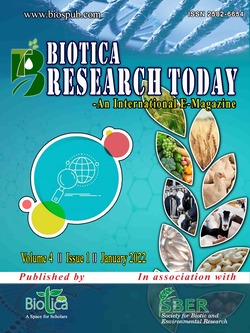
Adoption of Shahsarang and Megha SA-2: A Way towards Increasing Rice Productivity in Umran Village of Ri-Bhoi District, Meghalaya: A Success Story
Amit Kumar*
Plant Breeding Section, Crop Science Division, ICAR-RC NEH Region, Umiam, Meghalaya (793 103), India
Philanim W.S.
Plant Breeding Section, Crop Science Division, ICAR-RC NEH Region, Umiam, Meghalaya (793 103), India
Nivedita Shettigar
Plant Breeding Section, Crop Science Division, ICAR-RC NEH Region, Umiam, Meghalaya (793 103), India
Subhash Babu
Division of Agronomy, ICAR-Indian Agricultural Research Institute, New Delhi, Delhi (110 012), India
DOI: NIL
Keywords: Benefit cost ratio, Participatory seed production, Productivity, Rice
Abstract
In Meghalaya, rice occupies a major portion of the food basket relying heavily upon the crop for carbohydrate source. 37.84% of the total crop grown area is under rice. The state rice productivity is 1.9 t ha-1, which is lower than the national average of 2.4 t ha-1. Unavailability of improved planting materials and unawareness among the farmers regarding the benefits of using quality seed materials is the major bottleneck towards the achievement of higher crop productivity. Wilson Basaiawmoit was primarily involved in rice cultivation but not able to get higher return as he was practising cultivation of local varieties. Introduction of high yielding rice varieties, namely Shahsarang and Megha SA-2 have provided ample scope for augmenting field productivity resulting into higher income generation.
Downloads
not found
